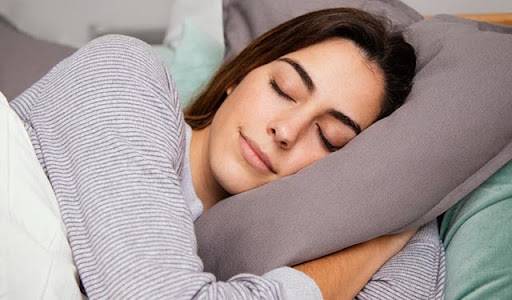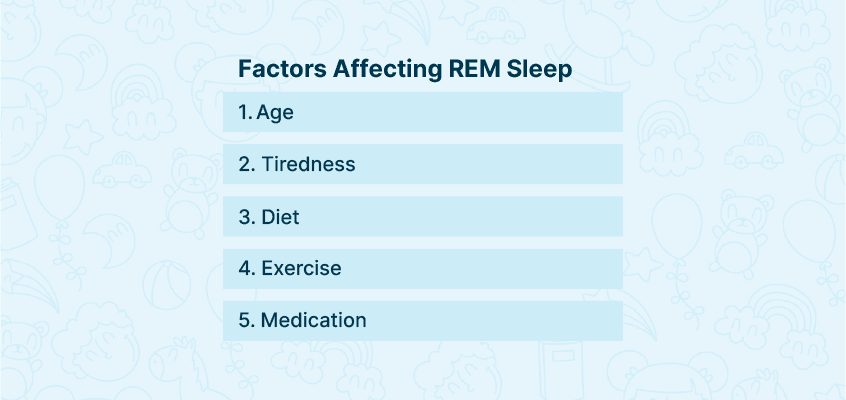Introduction
People call it Rapid Eye Movement (REM), Paradoxical Sleep, and the Dream State. However, this sleep state is a very light sleep where most dreams occur. In this article, we will look at Rapid Eye movement Sleep (REM), how you get into it, what’s happening in your body when you do, and what happens if you don’t get enough of it.
Our Wellness Programs
What Is REM Sleep?
Rapid Eye Movement Sleep (REM) is a phase of sleep where dreams occur. There is increased activity in the brain stem and neocortex during REM sleep. Training in these areas is higher than when we are awake.
The average length of REM sleep is about 20 minutes but can vary from 10 to 40 minutes. We usually enter REM sleep within a few minutes of falling asleep, and it becomes more frequent as the night goes on. The first REM period occurs after about 70 minutes of sleep. Subsequent REM periods occur approximately every 90 minutes.
The body alternates between muscle atonia (muscle relaxation) and tonus (muscle tension) during this phase. Atonia is characterised by temporary paralysis of limb and respiratory muscles, except for the diaphragm, which moves faster than awake.
A person awakened during REM will often describe their experience in dream-like terms: vivid imagery, intense emotions, bizarre thoughts, and dream-like perceptions. Suspension of our short-term memory happens during this time
Looking for services related to this subject? Get in touch with these experts today!!
Experts

Neelam Parwani

India
Life Coach
Experience: 5 years

Sapna Zarwal

India
Psychologist
Experience: 19 years

Deepti Gandhi

India
Life Coach
Experience: 6 years

Zabby Sharma

India
Life Coach
Experience: 11 years
What Are the Parts of the Sleep Cycle and Stages?
Sleep is a complex activity that involves several different parts of the brain. In the sleep cycle, there are two stages: NREM (slow-wave) and REM (rapid eye movement). Two or three processes occur during the night, with each cycle lasting about 90 minutes.
Different brain wave activities, eye movement, and muscle activity characterise each stage. The four stages of sleep are:
NREM Stage 1
The first period of sleep is the lightest stage. During this stage, people are still easily awakened. The eyes move side to side slowly, and the heart rate slows down. Stage 1 may last for five to 10 minutes. Usually, it is 0-5% of total sleep time.
NREM Stage 2
Like Stage 1, brain wave activity increases slightly, and eye movements stop. Sleep time in this stage is usually 5-10% of total sleep time.
NREM Stage 3
When brain wave activity is high with slow rolling eye movements, people in Stage 3 are difficult to awaken and often feel disoriented or confused. Blood pressure, pulse, and breathing rates decrease during this stage of sleep. This stage constitutes about 20-25% of total sleep time.
REM Stage 4
The final stage is REM (rapid eye movement) or dream state, which occurs about ninety minutes after falling asleep. Our eyes move back and forth very quickly under our eyelids during this phase, and we breathe rapidly.
How to Get REM Sleep Faster?
Your body is at rest during the first four stages of sleep, but your mind is still awake. It’s only in the final stage of REM sleep that your mind and body are completely relaxed. Achieving REM sleep faster will help you get better sleep. Here are some tips to help you get into REM sleep more quickly:
- Change up your daily routine: Try reading a novel or doing some crosswords instead of watching television. Reading will engage your brain and help you fall asleep quicker.
- Avoid caffeine: Caffeine can keep you awake for hours after you drink it. Try avoiding drinking coffee or avoid it before bedtime.
- Eat lighter meals: Avoid foods like meat, cheese, and fried foods at night that require a lot longer to digest.
- Keep a regular schedule: Keeping a plan will tell your body when it’s time for bed and when it’s time to wake up, making it easier for you to fall asleep faster every night.
The Benefits of REM Sleep
Some of the most prominent benefits of REM sleep are as follows:
1. Helps with learning and memory
During REM sleep, your brain processes information from the day so that you can remember it. It’s also when your brain consolidates memories so that they’re easier to recall later on.
2. Boosts creativity and inspiration
Your brain goes into overdrive during REM sleep, releasing a flood of neurotransmitters, including serotonin, and dopamine which helps you see things in new ways.
3. Helps with problem-solving
When you lose sleep or don’t get enough REM sleep, you’re more likely to have trouble solving problems or making decisions effectively the next day.
4. Improves mood stability and reduces stress and anxiety
Sleep deprivation is associated with higher levels of depression and anxiety and lower levels of contentment, satisfaction with life, and self-esteem. Getting enough REM sleep can reduce these feelings of stress and worry.
5. Stimulates brain growth
During childhood, REM sleep allows children’s brains to develop properly by promoting the growth of neurons and synaptic connections, which lay the foundation for more advanced cognitive functions later on in life.
Factors Affecting REM Sleep
The following factors affect the amount of time that you spend in REM sleep:
- Age: As you get older, the amount of REM sleep you get decreases.
- Tiredness: If you are exhausted, you will spend more time in REM sleep.
- Diet: Eating carbohydrates before bedtime increases the amount of time spent in REM sleep.
- Exercise: Exercise releases endorphins that make you feel relaxed, increasing the amount of time spent in REM sleep.
- Medication: Antidepressants and steroids can increase the time spent in REM sleep.
Conclusion
REM Sleep is when our minds are most active, which is critical for consolidating information and laying down long-term memories. When you get less REM sleep, it can cause a range of symptoms. With UWC’s wide range of sleep therapy counselling services, you can significantly improve the quality of your sleeping time. Check out more about UWC’s sleep and self-care counselling services and therapies here.















